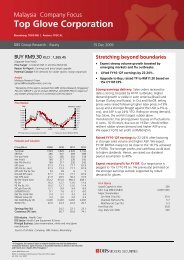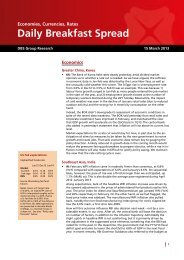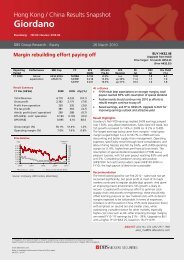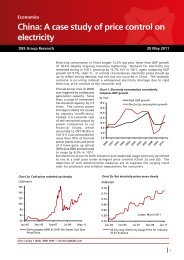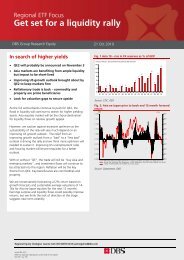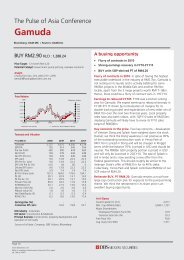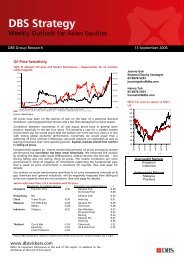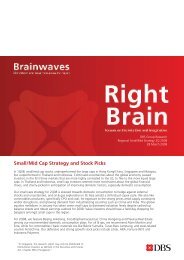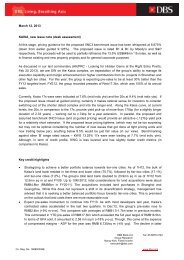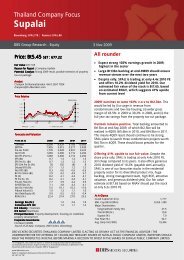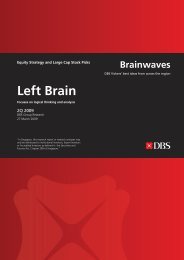Economics Markets Strategy - the DBS Vickers Securities Equities ...
Economics Markets Strategy - the DBS Vickers Securities Equities ...
Economics Markets Strategy - the DBS Vickers Securities Equities ...
Create successful ePaper yourself
Turn your PDF publications into a flip-book with our unique Google optimized e-Paper software.
<strong>Economics</strong> – <strong>Markets</strong> – <strong>Strategy</strong><br />
Asian Equity <strong>Strategy</strong><br />
Fig. 22: Singapore property / banks relative performance<br />
vs inflation rate<br />
Index %<br />
160<br />
8<br />
140<br />
120<br />
100<br />
80<br />
60<br />
40<br />
20<br />
0<br />
90 92 94 96 98 00 02 04 06 08<br />
Property / Banks relative performance (L)<br />
Inflation (R)<br />
Source: <strong>DBS</strong>, Datastream, Bloomberg<br />
market at 1.8% unemployment rate. Reflation should<br />
still be on track if economic growth remains strong<br />
and under a negative interest rate environment.<br />
Korea: Upgrade to Neutral from Underweight<br />
Korea is raised to Neutral following our expectations<br />
for a weaker won and forecast for cuts in Korean<br />
policy rates. Moreover, with <strong>the</strong> weaker-than-expected<br />
1Q GDP growth, growth fears has intensified among<br />
policy makers. And <strong>the</strong> new government could be<br />
rolling out fiscal stimulus, including rate cuts to<br />
bolster domestic demand. We still think <strong>the</strong> "747"<br />
economic pledge is ambitious, but <strong>the</strong> Korean government<br />
did lower growth potential to 6% from 7%. The<br />
new government should be working towards achieving<br />
this goal while continuing policy efforts to boost<br />
growth. Emphasis will be placed on revitalizing investments<br />
and domestic consumption, reinforcing competitiveness,<br />
and discovering new growth engines. Tax cuts and<br />
expansion of tax deductions, regulatory reforms and<br />
innovation of public companies, stabilising interest<br />
rates and exchange rates and support to boost exporters'<br />
competitiveness and stabilise current account balances<br />
are in <strong>the</strong> action plan for 2008.<br />
7<br />
6<br />
5<br />
4<br />
3<br />
2<br />
1<br />
-<br />
(1)<br />
(2)<br />
Fig. 23: Singapore / Hong Kong financials relative<br />
performance vs Fed funds rate<br />
% %<br />
80<br />
6<br />
60<br />
40<br />
20<br />
0<br />
-20<br />
-40<br />
0<br />
01 02 03 04 05 06 07 08<br />
Singapore / Hong Kong Financial sector relative performance<br />
yoy%<br />
Fed funds rate (RHS)<br />
Source: <strong>DBS</strong>, Datastream, Bloomberg<br />
Fig. 24: Singapore vs Hong Kong residential property<br />
price index<br />
Index<br />
450<br />
400<br />
350<br />
300<br />
250<br />
200<br />
150<br />
100<br />
50<br />
90 92 94 96 98 00 02 04 06 08<br />
Singapore<br />
Hong Kong<br />
Source: <strong>DBS</strong>, Datastream, Bloomberg<br />
5<br />
4<br />
3<br />
2<br />
1<br />
Hong Kong: Downgrade to Benchmark-weight from<br />
Overweight<br />
We have less preference for Hong Kong now because<br />
of its sensitivity to US interest rates, which are expected<br />
to rise from 4Q08 onwards. Since <strong>the</strong> Fed started<br />
to cut rates in August 2007, Hong Kong financials<br />
65



